Five key moments from the 2022 Vuelta a España
A comprehensive look at the events that shaped the season's final Grand Tour
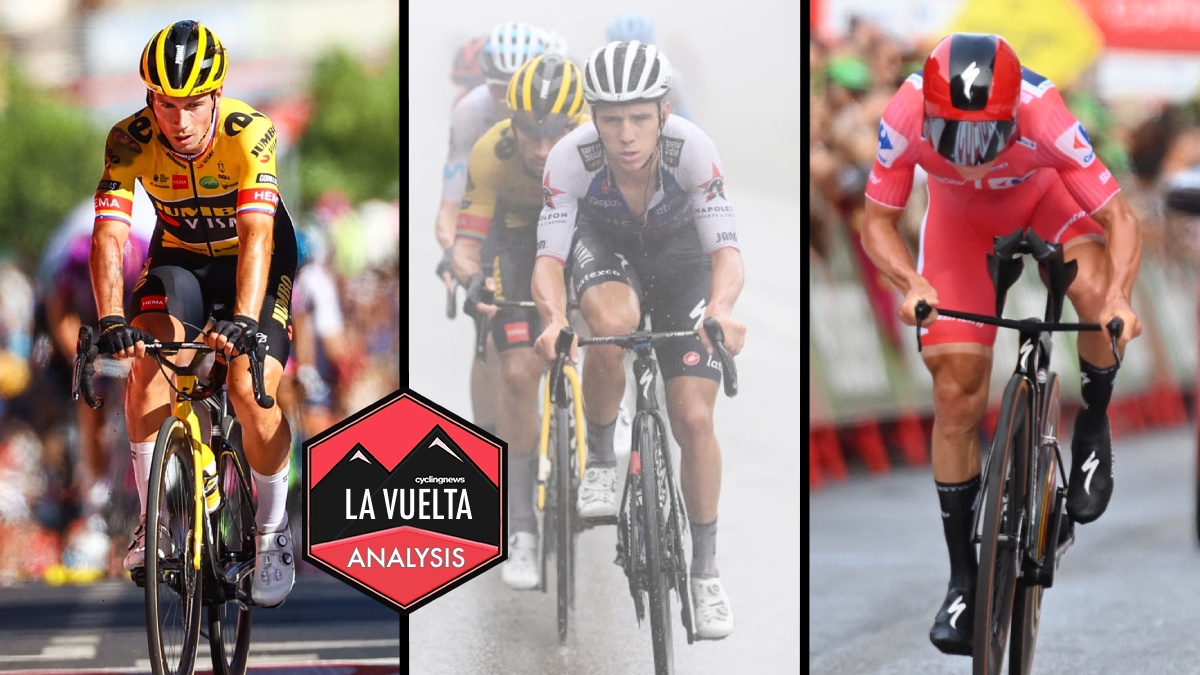
No matter what else happened of note in the Vuelta a España this year, one highlight stood out above them all. This was the race where Belgium, the sport's heartland par excellence, both ended a ridiculously long drought on Grand Tour wins. And it simultaneously did so with a rider whose dramatic rise to success when still in his very early twenties augers more than well for the years to come.
On Sunday night moments before he claimed his final red jersey, Remco Evenepoel (Quick Step-AlphaVinyl) called his Vuelta win "history for my team, my country and myself" and it's hard to disagree on all three counts. His initial stated goal of a stage win and a top ten placing overall was perhaps deliberately under ambitious as a way of avoiding media pressure.
But his final haul of a summit stage win, a time trial stage win and more than two weeks in red, not to mention a default victory in the best young rider classification, is testament to Evenepoel's potential, thoroughness and sheer hard work which he put into his buildup, as well as to what he was really able to achieve.
While much to Patrick Lefevere's delight, QuickStep-Alpha Vinyl have definitively shed their label of being 'just' a Classics team thanks to their first ever Grand Tour triumph, Evenepoel's 36th career win and tenth stage race also confirms the trend of young riders having greater and greater impact on this sport's highest levels.
As Joxean Fernandez Matxin, sports director at UAE Team Emirates and whose latest protege, Juan Ayuso, claimed the third spot on the podium at just 19, told Cyclingnews, "this kind of success [with young riders] is no longer surprising."
Apart from his youth, team and country, what was also noticeable about Evenepoel's triumph is how he was able both to turn around a Vuelta plot line that initially looked to be running against him and then manage his lead in such an assured fashion. It's already been almost forgotten, but for the best part of its opening week, Primož Roglič and Jumbo-Visma had been the rider and the team to beat in this year's Vuelta.
Jumbo-Visma's stunningly strong opening team time trial triumph on home soil in Utrecht, the swapping around of the red jersey between different teammates in the days that followed, and the powerful uphill victory for Roglič at Laguardia on stage 4 as soon as the race returned to Spain, all strongly suggested that the Dutch team were on line for a repeat of their Tour domination and that the Slovenian was back to his old Vuelta winning ways.
The latest race content, interviews, features, reviews and expert buying guides, direct to your inbox!
But subsequent events proved all those assumptions to be very wrong and even if the way Roglič was wrenched out of GC contention leaves plenty of room for speculation as to what might have happened, there's no denying Evenepoel's victory was taken with strength, style, excellent team support and well-calculated strategies.
The main consequence of his win is simple and yet potentially very far-reaching. Host nation Spain finally has seen their stage racing hopes for the future rise several notches in the Vuelta courtesy of Juan Ayuso and Ineos Grenadier's young racer Carlos Rodríguez. But for the here and now, Belgium has a Grand Tour champion again. And 22, time is most definitely on Evenepoel's side.
Evenepoel shows intent at Pico Jano
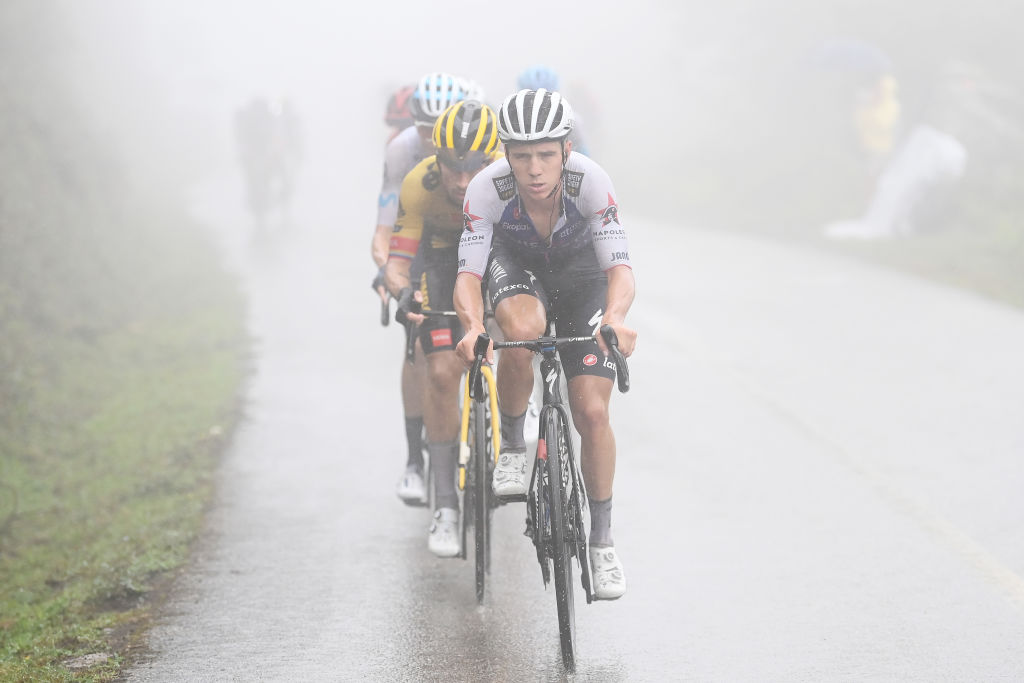
Early in the 2022 season, Remco Evenepoel appeared to be trying on different hats for size. At the Volta ao Algarve, for instance, he very deliberately resisted the temptation to fight for stage victory on the first summit finish on the Alto da Fóia, preferring to mimic Miguel Indurain by building his eventual GC win there around the time trial two days later.
But patience was never an entirely comfortable fit for this young man in a hurry. By the time the Vuelta rolled around, and after chastening stage racing experiences at Tirreno-Adriatico and the Tour de Suisse, he appeared to have weighed up the available options and decided to return to his default setting: all-out attack.
Evenepoel's lone race in the build-up to the Vuelta was the Clásica San Sebastián. His crushing victory there echoed his astonishing solo triumph at Liège-Bastogne-Liège in April, and he returned to the same playbook for the Vuelta's first summit finish in Cantabria on stage 6.
On a day of low cloud and driving rain, Evenepoel hit the front of the red jersey group with some 9km of the ascent remaining, and only an elite cadre of riders – including Primož Roglič, Jai Hindley, and Simon Yates – could even think about following. With a mile or so, only Enric Mas was left in his slipstream.
"He just rode away from everyone, no worries," Hindley said. "There's not much you can do in that situation."
Evenepoel disappeared into the mist, putting 1:22 into Roglič et al to claim possession of the red jersey. Although Mas somehow clung onto the Belgian's wheel until the summit, he couldn't even countenance giving him a turn. "I did ask for help, but he never answered me," Evenepoel said. "So that's why I kept going."
For a while on this Vuelta, it looked like he would never stop. (BR)
Alicante time trial confirms the lie of the land
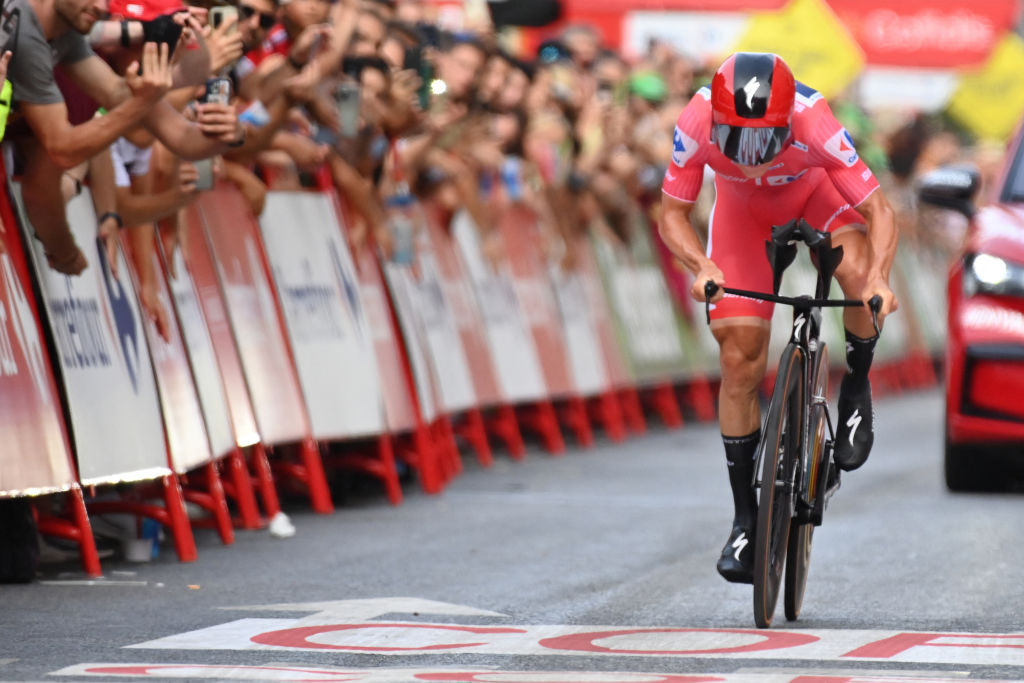
After completing the stage 10 time trial in Alicante, Roglič preferred to swing down a side street rather than hang around for a short stay in the hot seat. A small group of journalists jogged after him until he disappeared out of sight, at which point they had to rely on the hazy indications of holidaymakers and police officers – "¿Has visto a Roglič?" – to navigate their way to the Jumbo-Visma team van.
When they found Roglič, he was already warming down on the turbo trainer, digesting the news that Evenepoel had beaten him by 48 seconds in the 30.1km test. His assessment of the defeat was surprisingly upbeat.
"I can say I did a nice time trial, I'm proud of it, definitely," said Roglič. His view was that he had produced something like his best, Evenepoel had simply conjured up something substantially better. "Big congrats for Remco, he's on a different level at the moment."
Evenepoel began the time trial with all the momentum after he had dropped all his rivals, Mas included, at Les Praeres on stage 9, but that brought its own pressures. His Vuelta challenge had long been built around delivering a strong showing on his favoured terrain, and so this was the most important day of his entire race.
His exploits in Cantabria and Asturias – not to mention his 1:12 buffer on GC – showed that he clearly had the legs. Now this pan flat time trial offered itself as a test of his nerve and his focus.
A firm answer was provided. Evenepoel averaged 55.676kph across the course, with Roglič the only rider to finish within a minute of his time. In the overall standings, his lead had now yawned out to 2:41 over Roglič, with everybody else more than three minutes back. The Vuelta wasn't yet over – it hadn't even reached midway – but the road to victory had narrowed and steepened prohibitively for everybody bar the man in red. (BR)
Yates and Sivakov abandon with COVID-19
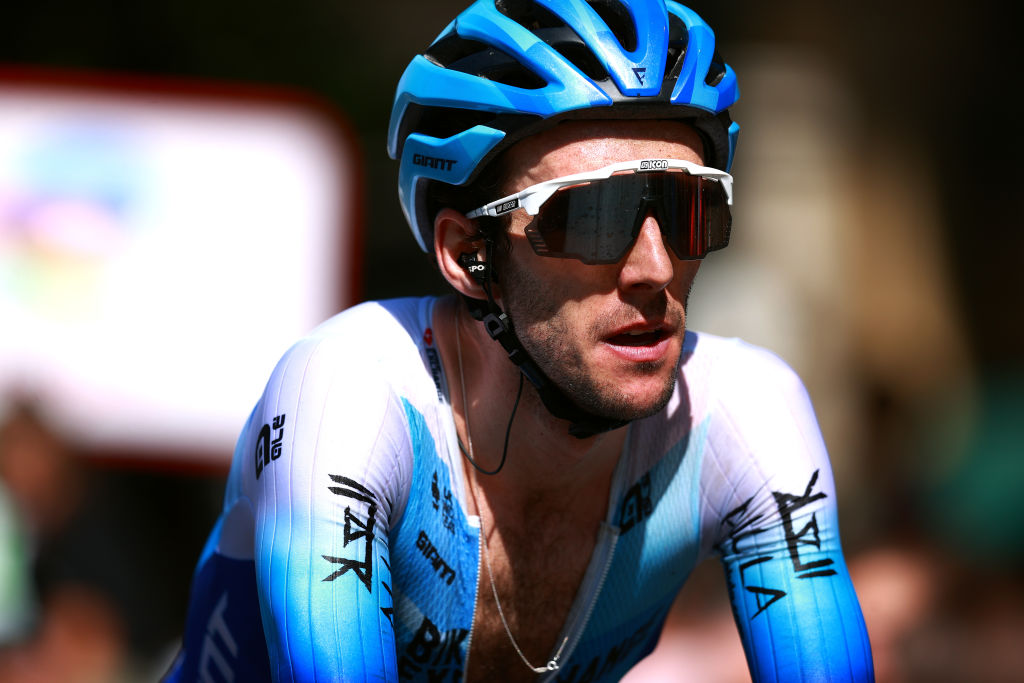
Deep in the heart of Murcia, the stage 10 start of the Vuelta a España in the factory of ElPozo was supposed to be all about a homage to local hero Alejandro Valverde (Movistar) and, given his retirement at the end of 2023, the imminent removal from the Vuelta chessboard of one of its most enduring and popular figures.
But while inside the factory's main precinct a sea of Murcia fans cheered Valverde to its sombre grey and steel rooftops, outside in the carpark two teams, BikeExchange-Jayco and Ineos Grenadiers were lamenting the imminent DNS of two key Vuelta riders.
One was the Australian team's leader Simon Yates, the other British squad's talented young racer and GC outsider Pavel Sivakov.
While the Ineos Grenadiers press officer unsubtly pre-empted attempts from journalists trying to gain insight into the consequence of Sivakov's exit from the squad with claims that the team were "flat out" and could not spare a moment to comment, a few metres away BikeExchange-Jayco's director Gene Bates offered a measured, if the categorical assessment of their loss of Yates as "devastating."
Then when the subject of Vuelta director Javier Guillén's post-stage interview that evening was switched last-minute from women's racing in Spain to focus exclusively on the seemingly relentless loss of riders to the virus, it was clear how seriously the pandemic continued to affect the race.
The list of abandons due to COVID-19 in the Vuelta finally totalled 26 (including one DNS as a result of pre-race testing), nine higher than in the Tour de France, and it made for sobering reading. On the sprinting side and after a memorable comeback from a rollercoaster season in the Vuelta's two Dutch stages, Sam Bennett's hopes of following in compatriot Sean Kelly's wheel tracks and taking green in the Vuelta jersey disappeared as a result of the virus.
The COVID-19 Vuelta hit list also ranged from veteran climber and former Angliru winner Wout Poels (Bahrain Victorious) to Ethan Hayter (Ineos Grenadiers), more than ten years his junior and whose hopes of a debut Grand Tour also disappeared in a thin double blue line on an antigens test. For Spain, young hopeful Ayuso was a near abandon as well after going down with the virus, although his squad's investment in a PCR machine proved critical in proving that he had a low viral load and could continue, finally to third place in Madrid.
The consequences outside the race per se was an organisation order that the media would be denied access to team areas at starts and finishes in a halfhearted attempt to maintain an anti-COVID 19 bubble that was to all intents and purposes already being ignored, often (but by no means always) by the teams themselves.
The actual effect on the race itself of COVID-19 is impossible to evaluate in terms of specific results. But as a general rule the absence of climbers as accomplished as Simon Yates, Poels or Sivakov notably deflated the Vuelta's potential for more dramatic battles in the mountains, and sharply whittled down the opposition to Evenepoel's reign in red in the process. (AF)
Evenepoel averts crisis at La Pandera
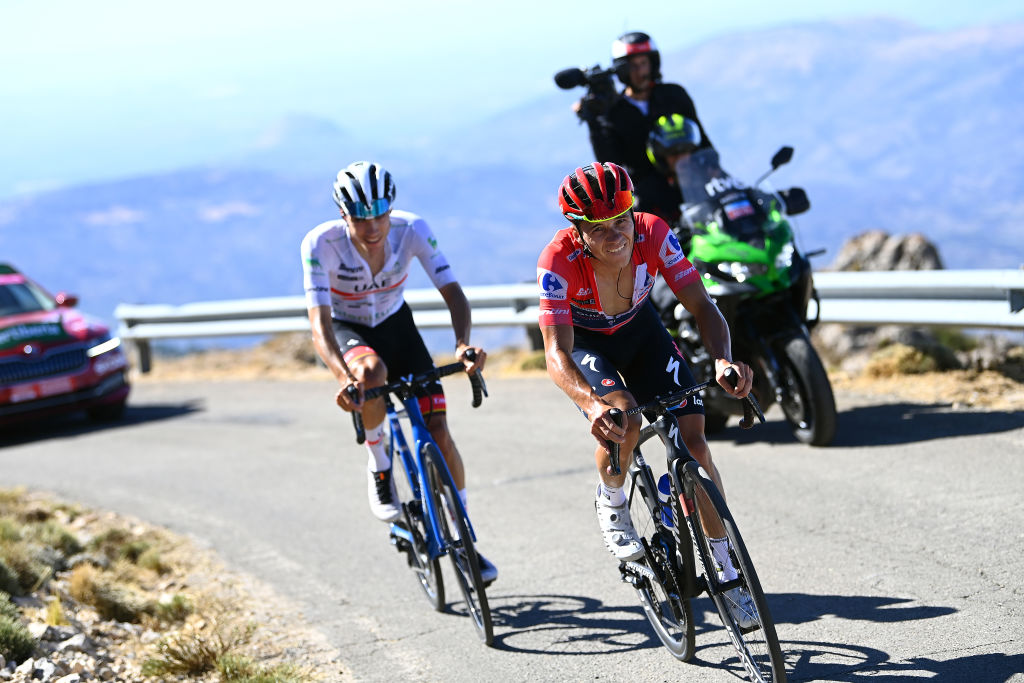
For two weeks, it seemed as though nothing could stall Evenepoel's momentum at the Vuelta, but his race took on a new guise a little over three kilometres from the summit of La Pandera on stage 14. To that point, he had never once been knocked off his stride, not even when he slid out on a corner on the road to Peñas Blancas two days later. The Vuelta was starting to look like a procession.
And then, all of a sudden, a bike race broke out again. Or, as Alberto Contador put it enthusiastically in his role as a television pundit: "Now there's a Vuelta."
At first, Evenepoel attempted to track Roglič's acceleration before thinking better of the endeavour. Shortly afterwards, his normally fluid pedalling slowed to a rather more strained cadence as he battled against his gear and the gradient. Riders who had suffered in his wake for two weeks now began to inch past him on their way on the way up the mountain.
When Ayuso, who had been forced to swap his bike for an ill-fitting spare from neutral service, caught Evenepoel, the Belgian's struggles were such that he briefly looked like losing the red jersey altogether. Instead, he managed to steady the ship in the final two kilometres, limiting his losses on Roglič to 48 seconds to maintain a lead of 1:50 in the overall standings.
Opinion was divided at the finish. In the Jumbo-Visma camp, directeur sportif Grischa Niermann saw an exposed heel: "It was the first time we see that he is vulnerable."
At QuickStep-AlphaVinyl, Evenepoel's teammate Ilan Van Wilder was almost comically nonchalant about the setback: "I mean, he didn't lose ten minutes. It's 50 seconds, so it's nothing to worry about."
It was all in the eye of the beholder, and there was merit in both points of view. Evenepoel was indeed vulnerable, as the time lost the next day at Sierra Nevada showed. But in managing his worst day of the race with such calm, he had taken another, significant step towards Madrid. (BR)
Roglic's exit
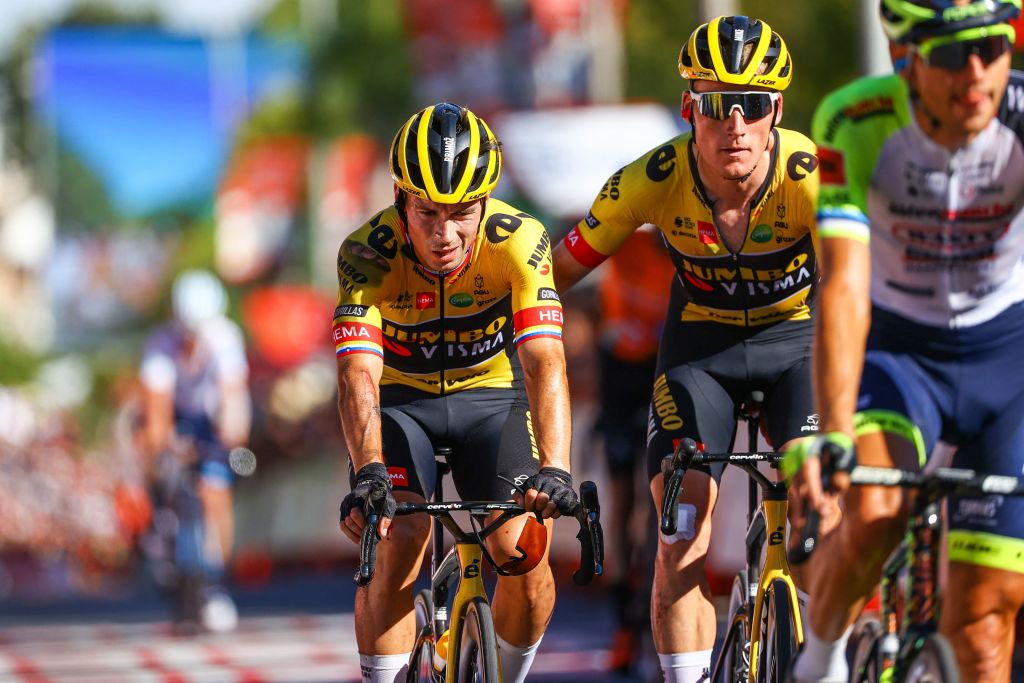
Back in 2017, when the Vuelta last finished on a short, nominally unremarkable, 100-metre rise on the outskirts of the equally nominally unremarkable dormitory town of Tomares, the small bunch sprint win had gone to accomplished allrounder Matteo Trentin. But what was noticeable how many of the top GC contenders, alerted to the risks of a last-minute split in what was a very technical run-in, had finished inside the top 20 on the stage.
This time round, the GC threat proved to be very different. Because while Primož Roglič's surging acceleration some three kilometres from the line felt very much like a continuation of his fightback on the overall which had started in the sierras of southern Andalucía, no one could have predicted how such an inoffensive looking transition stage would actually end for the Slovenian.
Roglič's attack, described by Guillén as "epic", occurred just as race leader Evenepoel had punctured inside the three-kilometer limit, and was never likely to take back more than a handful of seconds. But as a statement of intent concerning his plans for to destabilise Evenepoel's reign in red, Roglič's move was massive.
But then even as he appeared on the finishing straight, Roglič crashed. He could then remount and aided by teammate Mike Teunissen, cross the line, bloodied, battered and with a face as white as a sheet. But the long minutes he spent sitting with his back to the public on a pavement on the far side of a caravan, all strongly suggested this was a fall to the canvas with an impact of major consequences.
Less than 24 hours later, his DNS ahead of stage 17 confirmed it was all over. It was the most brutal end to an attempt, for the third time running, to bounce back from a huge setback in the Tour. But this time, after three straight Vuelta victories in 2019, 2020, and 2021, it wasn't going to work out.
The early segment of la Vuelta had made it look, briefly, as if Roglič was back in the driving seat of the race. He had then all but fallen by the wayside as Evenepoel upped his game in northern Spain, but never quit the GC picture as completely as, say, fellow contender Richard Carapaz (Ineos Grenadiers).
Instead, Roglič's first-ever defeat in in a Vuelta TT in Alicante (and on Spanish territory, for matter), courtesy of Evenepoel, had not been quite as devastating as predicted. Then on La Pandera, Roglič had revived the Vuelta's GC battle as he dropped Evenepoel close to the summit. But three days later, he was out of the battle completely.
Roglič's departure was simultaneously so unpredictable and created such a huge vacuum that it was hard to assimilate for the race and doubtless far, far more so for the rider himself. But it had really happened. Merely the way Jumbo-Visma sports director Addy Engels fought back the emotion the next morning when explaining his abandon made it clear how devastating this blow had been for his team and the rider.
One consequence of his untimely exit also grew clearer as the race then approached Madrid: for all Mas tried his best to dislodge Evenepoel, after Roglič's departure the Vuelta was all over bar the shouting.
Alasdair Fotheringham has been reporting on cycling since 1991. He has covered every Tour de France since 1992 bar one, as well as numerous other bike races of all shapes and sizes, ranging from the Olympic Games in 2008 to the now sadly defunct Subida a Urkiola hill climb in Spain. As well as working for Cyclingnews, he has also written for The Independent, The Guardian, ProCycling, The Express and Reuters.
